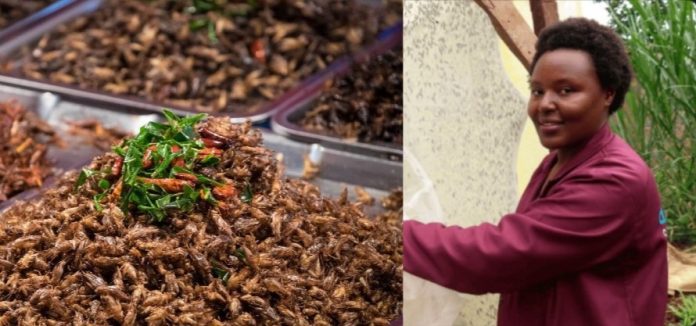Insect farming remains one of the most lucrative yet less popular agribusinesses in Kenya. This is a gap that Jannifer Muthike was quick to fill, thanks to her background knowledge in insect farming.
Muthike’s insect farming journey began in 2012 when she was admitted to Moi University to pursue a degree in entomology and parasitology.
“Initially, I didn’t want it. I tried switching courses and even universities, but nothing worked,” she said.
After graduating in 2017, she delved into the world of large-scale insect farming, where she was mentored by an agripreneur. A year later, she decided to dive fully into the business by enrolling at the International Centre of Insect Physiology and Ecology to study insect farming.
After completing the course, she started insect farming at her grandmother’s house. It was not long before the business peaked, and soon she attracted customers from various countries, including Kenya, Rwanda, and Uganda.
As demand continued to soar, Muthike invested Sh700,000 into the business, now christened Dudumasters. The farm, located in Kutus, Kirinyaga County, hosts various species of insects, with the main ones being red worms and black soldier flies.
Edwin Githae: What we found out after investing in grape farming in Kitui
Currently, the farm produces at least 5 tons of vermicompost weekly, which earns the farmer Sh50 a kilo. On a good week, she makes up to Sh250,000 – earning more than some corporate executives.
Vermicompost is a nutrient-rich organic fertilizer produced by worms as they break down biodegradable waste like food scraps and plant matter into a dark, crumbly substance called vermicast.
The production process begins with the collection of biodegradable waste which is then packaged into rearing beds, whereby either red worms or black soldier fly eggs are added. Within 21 days, the waste will usually have been vermicomposted into a nutrient-rich waste.
The mature maggots are then harvested, dried, and sold as high-protein animal feed. The nutrient-rich waste, which is now essentially fertilizer, is packaged into 50 kg bags and sold for Sh2500 per bag.
“We also sell eggs to farmers looking to set up small units at home. A 10-gramme pack sells for Sh2,500,” said Jennifer. Her biggest challenge is marketing the products to clients, as many people are skeptical about insect-based products.
For farmers seeking to start the venture, Jennifer advises them to invest about Sh35,000 into acquiring a small-scale starter kit, which includes a cage and stand pre-populated with insects.









